Our trimestral reports are written by Susan Laker for our Kampala programs and by Aidah Wafula for our Jinja programs. In addition to our Child-Sponsorship Program we run additional programs throughout the year benefitting all children and their community. This report shows the programs that have been running the trimester July- September 2025. We also invite you to check out our Instagram stories to find out more about the activities that we carried out during this time.
1. EDUCATION
Kampala
During this trimester, the Kampala team focused on a series of educational and community support initiatives aimed at improving children’s school performance while deepening parental involvement in their growth and wellbeing. Weekly parents’ meetings were held throughout July and August, creating a safe and open space for dialogue on the main challenges affecting both children and families.
The discussions explored sensitive but crucial topics such as domestic violence and its lasting impact on children’s emotional and academic development and the inability of some parents to provide essential scholastic materials. Many parents also acknowledged difficulties related to low literacy levels, limited communication with teachers, and unemployment, which are frequently linked to broader issues such as lack of business skills and family planning. These discussions helped the community recognize how social and economic hardships are closely tied to educational outcomes.
Parents were encouraged to take active steps toward self-reliance by forming small savings groups, starting income-generating activities, and participating in community health and awareness sessions. Several parents expressed strong interest in further business-skills training to improve household income and ensure a more stable environment for their children.
In August, the focus shifted to children’s behavior at home and in school. Together with teachers, the team worked to identify underlying causes of misbehavior, which often stemmed from a lack of attention, inconsistent discipline, domestic conflicts, peer influence, and the absence of emotional support. The meetings gave children an opportunity to express themselves freely, and many shared that acting out was often a way of seeking attention or trying to communicate unmet needs.
These open and honest exchanges strengthened trust between children, parents, and teachers, fostering an atmosphere of empathy and understanding. Families became more aware of the importance of emotional support and communication, while teachers and parents began working more closely to ensure that each child feels heard, valued, and guided. Overall, the education program has continued to yield positive results, not only through improved academic performance but also by building a stronger, more supportive community around every child.
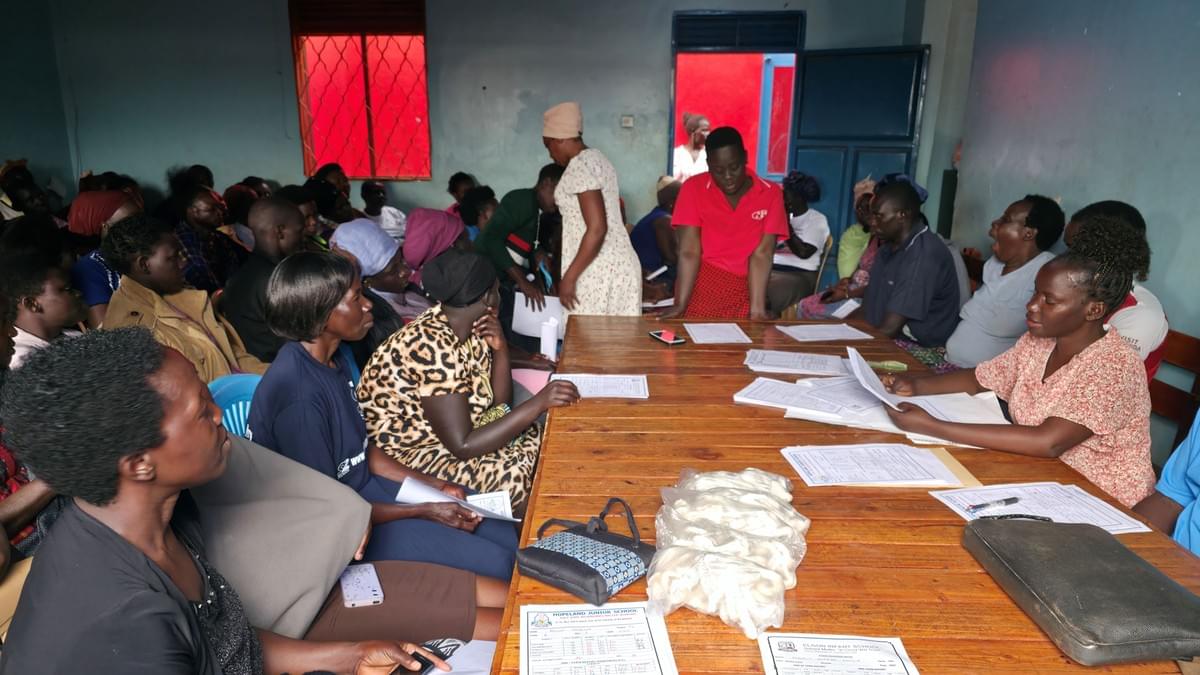
Jinja
Throughout the months of July, August, and September 2025, the education program in Jinja continued to run smoothly, with encouraging progress across all levels. There were no reported cases of dropout, and all children remained actively enrolled in their respective schools.
In July, all students in Senior Four at Jinja Secondary School were successfully registered for their upcoming Uganda Certificate of Education (UCE) national exams scheduled for October 2025. The same month saw numerous academic and social activities across schools, including an end-of-course prom party and a commissioning and prayer day for candidates at Jinja Progressive Secondary School, held on July 26th. By the end of July, most schools were preparing for their Mock examinations, particularly for the Primary Seven (P.7), Senior Four (S.4), and Senior Six (S.6) candidates.
Term Two officially concluded in mid-August, with most private schools closing by the 15th and holidays beginning on the 16th. During this period, several students participated in academic tours and recreational activities, such as a trip to Ntinda and a children’s carnival, offering them both learning and enjoyment opportunities. Parents and teachers also held meetings to discuss children’s progress and ways to maintain academic engagement during holidays.

In August, the second academic term closed successfully, and nearly all children sat for their end-of-term exams. External mock exams for candidates delayed the release of results, which were later shared at the start of Term Three. To enhance academic preparation, the team organized holiday programs for P.7 and S.4 candidates, providing them with extra contact hours with teachers to strengthen their readiness for national exams.
Term Three began on 8th September 2025, with all sponsored students reporting back to school. Mock results for the P.7 candidates were released on 28th September, showing promising performance improvements.
The team also continued computer classes at the Jinja centre for non-candidate students throughout the trimester, ensuring consistent digital literacy training.
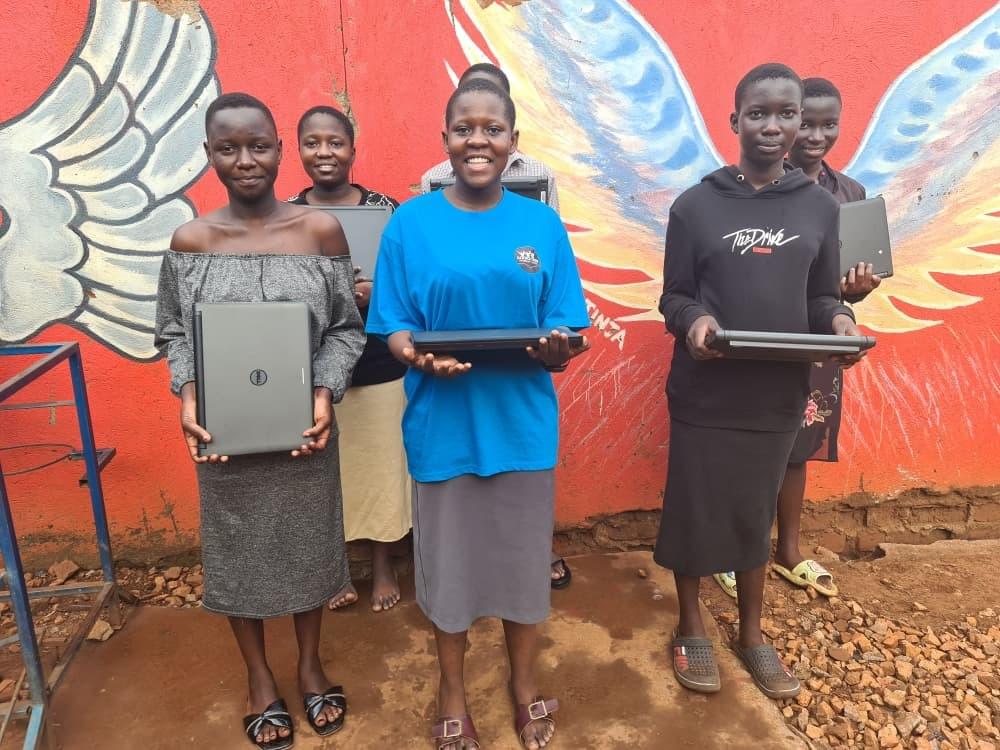
2. NUTRITION PROGRAM
Kampala
The nutrition program continued to play a key role in supporting the health and education of the children. In July 89 children participated in the Sunday lunch program, receiving hot meals of rice, groundnut sauce, silver fish, beans, and posho. Meals were sometimes served at the office and other times on the hill, allowing all children to eat together. In August the attendance increased to 265 children, who were served nutritious meals every Sunday. The children also received educational talks before lunch, focusing on the importance of education, computer literacy, and community programs. In September the team maintained the same structure, serving 265 children every Sunday with nutritious meals. The consistent provision of food has helped reduce malnutrition, improved school attendance, and strengthened community relationships.
Parents and community members expressed deep gratitude for this initiative, recognizing that proper nutrition supports not only the children’s health but also their capacity to learn and thrive.
Jinja
During the school holidays in August, attendance was particularly high, as more children were available to participate. These meals not only provided essential nutrition but also fostered a sense of community and belonging among the children.
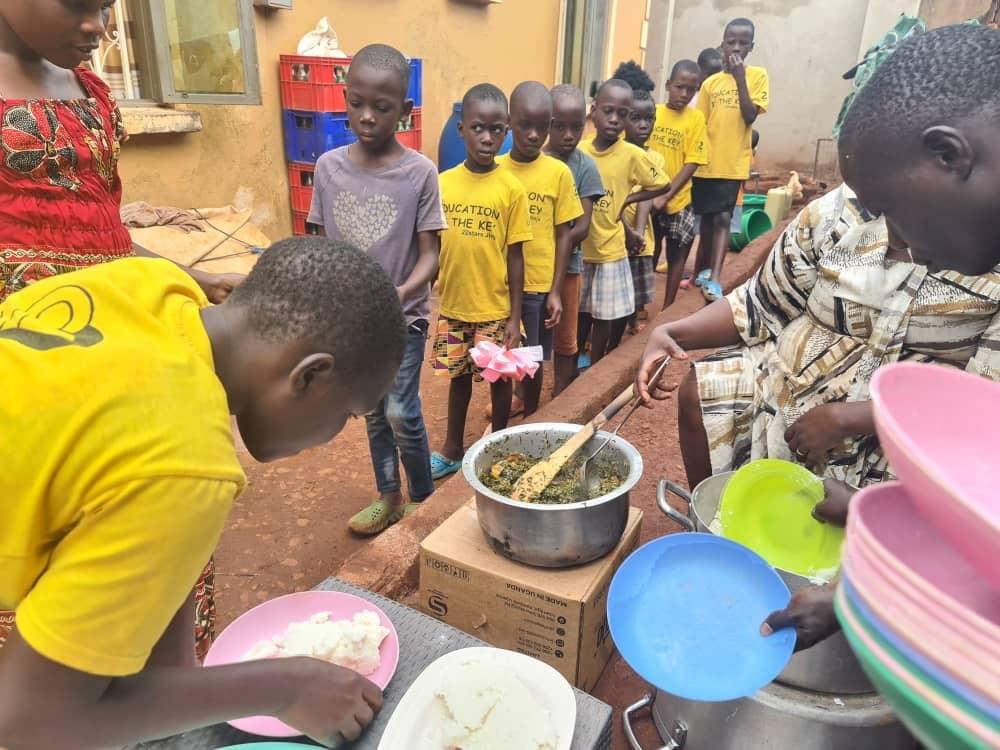
3. HEALTH AND EYE-CARE PROGRAM
Kampala
Throughout this trimester, the health program continued to address both individual and community wellbeing. In July, Project Manager Susan Laker experienced serious health challenges and was taken to the hospital thanks to a fundraiser organized by Stella and the local team. This gesture brought her great relief and renewed hope at a time of deep uncertainty. Susan underwent medical evaluations at the Cancer Institute and began ongoing treatment related to a condition first detected in April. She continues to receive medical care and follow-ups to monitor her recovery and determine further treatment steps.
During August and September, a few children fell ill with minor cases of flu and cough, which were manageable and treated by their parents or guardians. These incidents reminded the team of the importance of preventive health care, proper nutrition, and timely medical attention. Parents were encouraged to attend community health sensitization sessions and to seek medical help promptly instead of relying on traditional beliefs or home remedies.
Overall, the trimester showed positive progress in community awareness about health issues. Families increasingly understand the link between good nutrition, regular check-ups, and children’s academic performance. The team remains committed to promoting health education and supporting those in need of medical care.
Jinja
The health of the children and community members remained generally stable throughout the trimester. Minor cases of illness such as malaria, flu, and cough were reported, but all were quickly managed by parents and guardians.
In September, a few specific cases were noted, including Nangobi Gidah, who was diagnosed with malaria, and Byaruhanga Joseph, who was treated for ulcers. All affected children received proper medical attention and recovered well.
Through continuous sensitization and close follow-up, parents have become more proactive about taking their children to health facilities instead of relying solely on home remedies. The team continues to promote preventive care, hygiene, and awareness of early medical intervention.
4. VARIA PROGRAMS
Kampala
The trimester was also marked by a variety of community events, visits, and developments that strengthened relationships within the project and improved living conditions for families.
In July, the Kampala team celebrated the birthday of Director Stella Airoldi Romana with both children and parents. The celebration began at school and continued at Ggaba Beach, where everyone shared food and laughter to honor Stella’s special day. That same month, two boreholes were drilled—one in Kampala and one in Jinja—thanks to the generosity of our amazing donor Jascha Lang. These new water sources now provide clean and safe drinking water to hundreds of community members. The team also visited sponsored children in boarding schools to monitor their academic progress, listen to their experiences, and ensure their wellbeing.
August brought a special visit from Fabian from Germany, who spent time learning about 22STARS’ mission, goals, and ongoing challenges. He shared local meals with the team and discussed possibilities for future sponsorships. The project manager emphasized the urgent need for additional sponsors to cover school fees for vulnerable children who are still waiting for support. During the same month, the team received funds for the drilling of a second borehole in Kampala, thanks to the generous donation of Tim Arns, and also received laptop donations from Jascha Lang, which will greatly enhance the children’s digital literacy and educational opportunities. Meanwhile, students from Hopeland Boarding School returned home for a three-week break, while candidates preparing for national exams remained in school for study sessions.
In September, the second borehole was completed in Kampala and began serving the community, offering clean and reliable access to water. Although there were no in-person visits during the month, communication continued with prospective visitors planning to come in October. The team expressed deep gratitude to all donors and supporters for their unwavering commitment, which has continued to create meaningful and lasting change in the community.
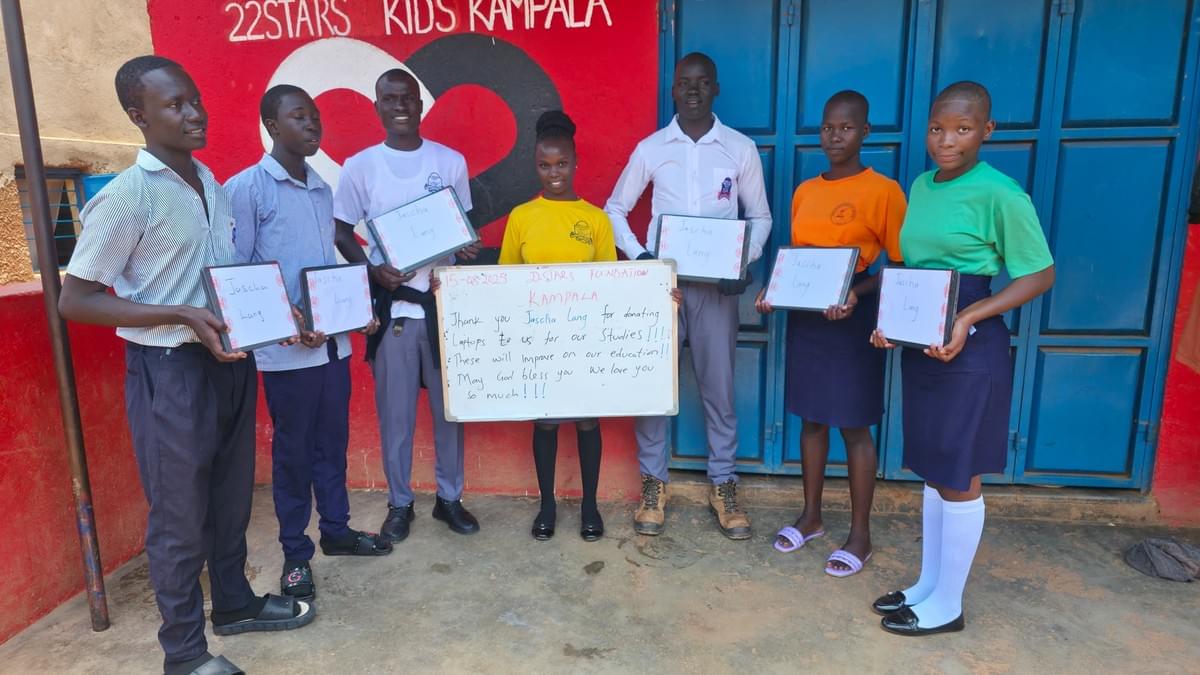
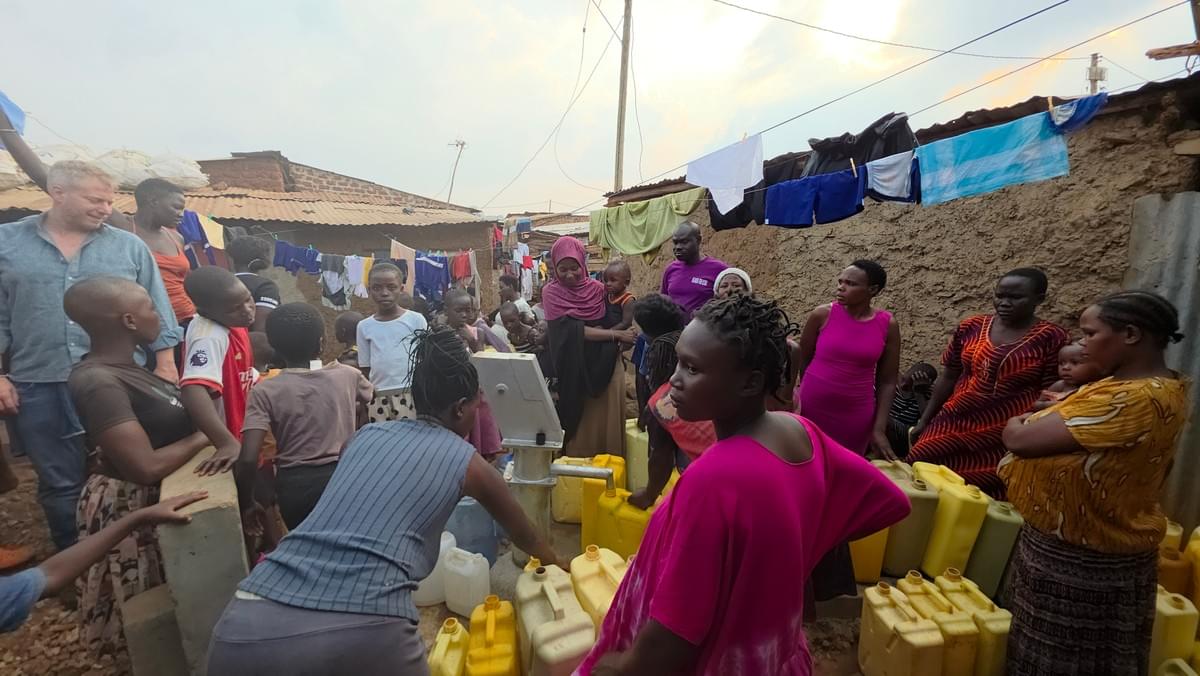
Jinja
This trimester featured several important community milestones, celebrations, and infrastructure improvements that contributed to the wellbeing and cohesion of the Jinja community.
In July, the team celebrated the birthday of Director Stella Airoldi, honoring her leadership and impact on countless lives. Later that month, Aidah, the local project manager, was surprised with a heartfelt birthday celebration organized with support from the Foundation. These joyful gatherings strengthened team spirit and deepened the sense of community among staff, parents, and children.
By the end of July, a parents’ meeting was also held to discuss their crucial role in guiding children during the holidays, emphasizing mentorship, discipline, and collaboration with teachers to ensure academic excellence.
We also received received laptop donations from Jascha Lang, that will truly help improve the education of our children.
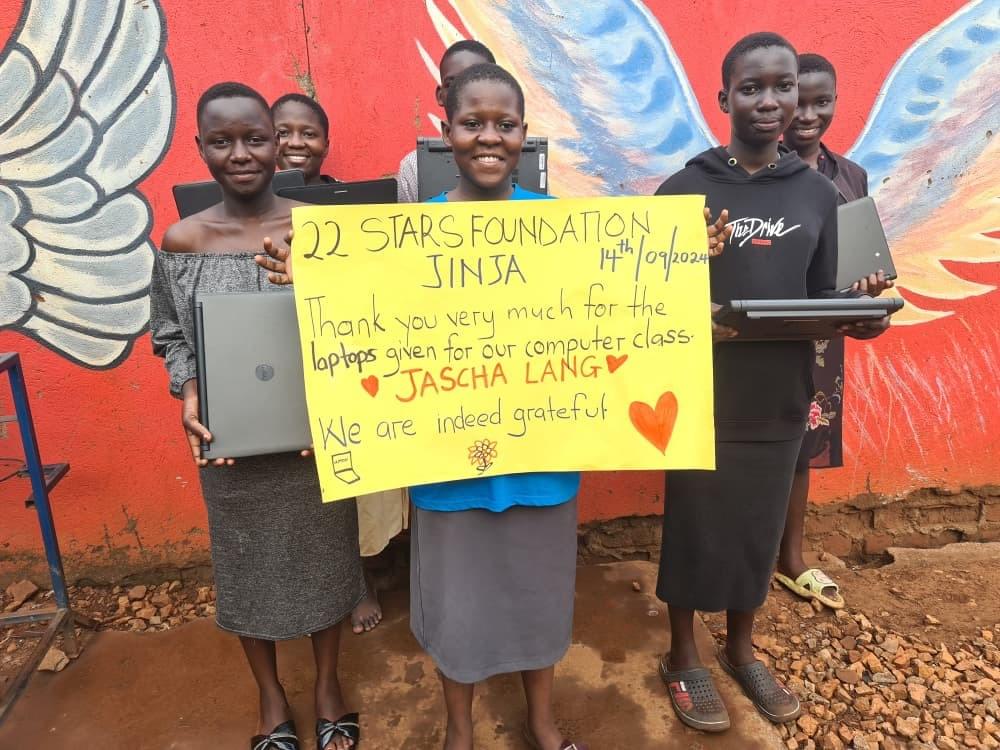
A major achievement of this trimester was the construction of a new borehole in the Musima Kainogoga area. The borehole proposal was approved and funded in July by our generous donor Jascha Lang, and drilling began immediately. Although the first drilling site was too rocky, the team relocated and continued breaking through hard stone to reach the permanent water table. By September, the borehole construction was in its final stages, with piping and well-building completed. The community is now preparing to begin fetching clean and safe water — a development that will significantly reduce the prevalence of waterborne diseases and improve overall living conditions.
The successful completion of the borehole and ongoing community engagement mark significant progress in improving the health, education, and empowerment of the Jinja community.